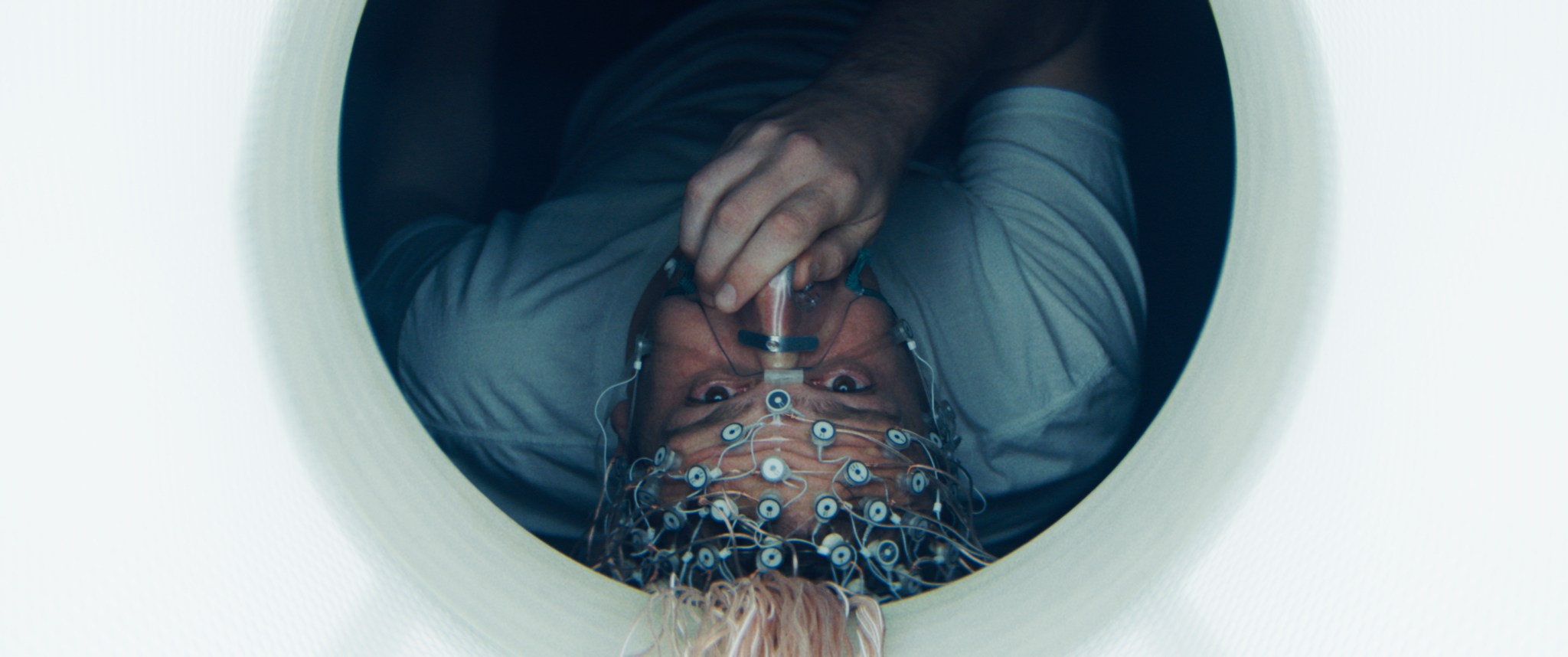
MPAA Rating: R | Rating: ★½
Release year: 2017
Genre: Comedy, Drama, Mystery, Romance, Sci-Fi Director: Charlie McDowell
The Discovery is a poor, albeit ambitious, imitation of the superior Eternal Sunshine of the Spotless Mind. Beat for beat, scene by scene, both the concept and tone are so similar to Michel Gondry and Charlie Kaufman’s film as to be a strange doppelganger, a copycat just slightly off-kilter as to be distinct, but too similar to be coincidence. Both films feature a dyed-hair Manic Pixie Dream Girl encountered by a diffident man on a beach; the two fall in love, but must navigate the strange memory-bending sci-fi mystery they find themselves in. Both films feature a strange machine with wires and helmets which affects memory, as well as scenes within one character’s cerebellum. Both have similar soundtracks, settings (wintery East Coast), and parallel characters: an older sure-of-himself scientist, a younger female acolyte enamored with the scientist, a goofball pot-smoking assistant to the scientist, etc. Where the films diverge is the premise, as the titular “discovery” refers to a scientist’s (Robert Redford) scientific verification that there is, in fact, an afterlife for human beings. This premise is explained in expositional bludgeoning through an opening TV interview. As the interview explains, in the years following the discovery, millions of people commit suicide trying to “get there.” Does Redford’s scientist feel responsible for their deaths? “No” he calmly responds, right before one of the TV tech shoots himself in the head on camera in order to “get there.”
The irony is that The Discovery never “gets there” itself. Director Charlie McDowell appears to be a keen Kaufman disciple; his previous film, The One I Love, centered on a youngish couple going through marital troubles which are compounded when they meet their ideal doppelgangers at a bizarre marriage retreat center. It’s an interesting concept with a sci-fi bent, quirky without becoming twee. Yet I found myself frustrated and uninvolved by the film’s conclusion, as it both over-explains its strange premise while leaving far too many unanswered questions and gaping plot holes as to be acceptable. In short, it aims for something unique and intriguing, tries really really hard to get there, and…doesn’t. The Discovery follows suit, only more so. It’s the filmic equivalent of the nerdy teenage know-it-all, that young man who does his best to impress and fit in by beginning sentences with “Actually…” before passionately and awkwardly explaining a concept (incorrectly), yet is so damn sure of himself and so socially unaware as to warrant a non-response in his listeners, as they’d just rather be done with the conversation. He’s trying so very hard to appear interesting and smart, but the more he tries, the more annoyed the audience becomes.
Actor Jason Segel is terribly miscast as Will, the son of Redford’s scientist, Thomas, and a neurologist intent on stopping his father’s terrible legacy. It’s nearly impossible to believe the slight, ruddy and red-haired Redford is the biological father of the colossal Segel, and the latter’s work in mostly comedic films brings an expectation that The Discovery might be darkly funny. And it could be, or at least it tries to be. It’s honestly exasperating to discern what the film is trying to do. The film’s tone is so uneven, it’s difficult to say whether this is a dark romantic-comedy, a sci-fi thriller and mystery, a bitter satire about religion and science, or a mashup of all the above. In one scene, Will’s brother Toby (Jesse Plemons) says that Isla (Rooney Mara), the MPDG that Will saved from suicide on the beach, is now dead. Will just looks at Toby stunned, until Toby admits that he was joking. It’s the feeling that Will experiences there, that uncomfortable wondering if this is all a joke–that’s how I felt watching The Discovery. In another scene, Toby plays guitar and harmonica as the opening number to a presentation from Thomas, who proceeds to publicly humiliate one of his cult-like followers (wonderfully portrayed by Riley Keough, who doesn’t get nearly enough screen time for her talents). Is this supposed to be fun? Sad? Weird? It’s a scene which feels like it was cut out of The Lobster. For all the imitating The Discovery does, it might be.
The love story between Will and Isla is unbelievable in every way, their affection built mostly around stealing a cadaver together. The lack of chemistry and reasoning behind their relationship leads up to the incoherent finale, which attempts to outdo Eternal Sunshine‘s incredible pathos by adding the potential death of a child into the mix of memory loss and muddled narratives. It feels manipulative and forced, and the sci-fi elements make little sense by the end of the film, serving mainly as tools to keep the story going rather than actual concepts worth exploring. For a film about “proving” the existence of the afterlife, The Discovery suffers from the same problems as The One I Love–it over-explains while presenting little actual evidence or awareness of its own ideas. The film screened at Sundance earlier this year in January, and is now streaming via Netflix. Y’know what I wish was currently streaming on Netflix? Eternal Sunshine of the Spotless Mind. That’s a film worth discovering and remembering.
IMDB Listing: http://www.imdb.com/title/tt5155780/
Leave a Reply